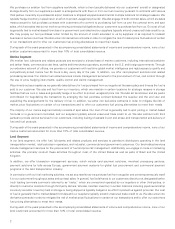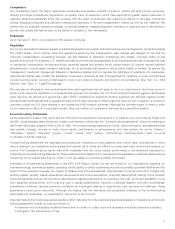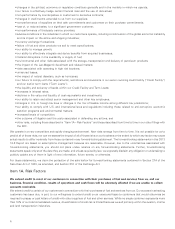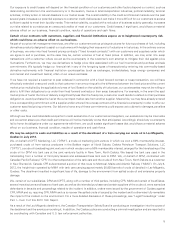World Fuel Services 2013 Annual Report Download - page 18
Download and view the complete annual report
Please find page 18 of the 2013 World Fuel Services annual report below. You can navigate through the pages in the report by either clicking on the pages listed below, or by using the keyword search tool below to find specific information within the annual report.To the extent that we use third parties in our operations in foreign markets, we are also subject to the risk that we would be held
accountable for the failure of these third parties to comply with the laws and regulations of the U.S. and various international
jurisdictions.
Current and proposed derivatives legislation and rulemaking could have an adverse effect on our business.
The Dodd-Frank Wall Street Transparency and Accountability Act of 2010 (the ‘‘Act’’) provides for federal regulation of the
over-the-counter swaps market both for commodities and securities, and gives the U.S. Commodity Futures Trading Commission
(‘‘CFTC’’) and the SEC broad authority to regulate the swaps market and its principal participants. This includes, among others,
derivative transactions linked to crude oil, refined products and natural gas prices. The CFTC and the SEC are continuing to consider,
finalize and implement rules governing, among other things, where swaps are transacted (on exchange versus off exchange); how
they are transacted (cleared versus uncleared; margined versus unmargined); the differing responsibilities of those who participate in
over-the-counter derivatives (end users, swap dealers, major swap participants); and the application of cross-border rules in the global
derivatives market. Regulations setting limits on the size of a party’s derivative positions in major energy markets were adopted by the
CFTC but vacated after a successful challenge in Federal court. In November 2013, the CFTC proposed a new position limits rule which
would limit trading in options, futures, and swaps contracts related to certain agricultural, metal, and energy commodities, including
energy commodities in which we currently engage in derivative transactions. We cannot currently predict whether or when the
proposed rule will be adopted or the effect of the final rule on our business. Furthermore, certain of the other requirements under the
Act have taken effect and other regulations that could have a significant impact on us are expected to be finalized in the near future.
In addition, various foreign jurisdictions have adopted or are in the process of adopting legislation regulating the use of derivatives,
including Singapore and Europe, where we currently conduct certain derivatives related activities.
As regulations are finalized, adopted and implemented, we continue to evaluate how legislation will impact our ability to conduct our
business. In particular, the Act and any new (or newly implemented) regulations and international legislation could significantly
increase the cost of our derivative contracts (including through requirements to post collateral, which could adversely affect our cash
flows and liquidity, or subject us directly or indirectly to reporting requirements), materially alter the terms of our derivative contracts,
reduce our ability to offer derivative and other price management products to our customers, reduce the demand for our price risk
management services, reduce the availability of derivatives to protect against risks we encounter, increase price volatility in
commodities we buy and sell (and derivatives related to those commodities), reduce our ability to monetize or restructure our existing
commodity price contracts, and increase our exposure to less creditworthy counterparties. If the increased cost of derivative contracts
is significant or we reduce or limit our derivatives activities as a result of the legislation, our profitability and results of operations could
be adversely affected. Any of these consequences could have a material adverse effect on us, our financial condition, and our results
of operations and cash flows.
Increased governmental regulation of shipments by rail of crude oil and other fuel products may lead to additional
costs.
We rely in part on rail shipments to transport crude oil and other fuel products in both the United States and Canada. Recent rail
incidents have led and are likely to continue to lead to additional governmental regulation of rail shipments of crude oil and other fuel
products in Canada and the United States and to increased safety standards for the tank cars that transport these products. We cannot
predict with any certainty what form any additional regulations may take. Any increased regulation could result in higher operating
costs, which could adversely affect our operating results.
Material disruptions in the availability or supply of fuel would adversely affect our business.
The success of a significant portion of our business depends on our ability to purchase, sell and coordinate delivery of fuel and
fuel-related services to our customers. Our business would be adversely affected to the extent that political instability, natural
disasters, terrorist activity, military action or other conditions disrupt the availability or supply of fuel. In addition, we rely on a single or
limited number of suppliers for the provision of fuel and related products and services in certain markets. These parties may have
significant negotiating leverage over us, and if they are unable or unwilling to supply us on commercially reasonable terms, our
business would be adversely affected.
Our cash equivalents and investments are subject to risks that may cause illiquidity and losses from declines in value.
Our cash equivalents, principally consisting of overnight investments, bank money market accounts and bank time deposits are
subject to credit, liquidity, market and interest rate risk, which can be exacerbated by volatility in the capital markets. Adverse changes
in this respect can result in the decline of the fair value of our cash equivalents and therefore our liquidity, which could materially affect
our business, financial condition, results of operations and cash flows.
12
























